About the Ballard Farm, Jersey Cows and Their Milk

In order to focus more intensely on cheese production, the Ballards sold their dairy operation to a local farm in 2021. Milk from the 100% Jersey cows
The Ballards take fresh milk from the cows directly to cheese vats. Unlike the large cheese producers the Ballards do everything in small batches with very little technology.
That's not to say the Ballard's avoid technology. The family has focused on energy efficiency as a way to improve financial security, environmental impact and quality of life at the cheese plant. The Ballard's reduced the carbon and water footprint of their operation while saving money. You can read about their efforts in a story at the World Wildlife Foundation and view a video here.

The Ballard's set a goal to reduce their overhead by 10 percent and eliminate propane use. An energy audit and a team of energy management experts helped them design and implement a comprehensive plan to achieve their goals. Engineers, contractors, dairy associations, financial institutions, energy providers and the USDA combined their expertise to help the Ballard's design their custom efficiency project.
Together, they identified multiple energy improvements and four primary areas of savings:
- using solar thermal power for the hot water system
- installing LED lighting
- replacing vacuum pumps
- adjusting the milk cooling process
Because of their commitment, detailed plan and conviction, the Ballards achieved their goals, saving $23,000 annually and reducing the dairy’s carbon footprint by 121,500 pounds per year. They also decreased the dairy’s water footprint by 365,000 gallons annually. The Ballards believe that every farm has some aspect of energy management that can be improved, and with proper direction and support all dairies can improve their environmental impact and bottom line.

Best Practices
Solar Thermal Power
Ballard Family Dairy & Cheese originally used a propane-fired steam boiler system, which was operating at 33 percent efficiency. The family decided to replace the boiler system with an evacuated tube collector solar thermal supply, a heat pump ,and high-efficiency electric boiler. In making these upgrades, the Ballards reduced their energy usage by 67 percent. Solar thermal now supplies approximately 50 percent of their heating needs. Designed to meet the needs of the dairy as it expands, the hot water system has already resulted in a carbon dioxide reduction of 89,500 pounds and cost savings of $15,000.
LED Lighting
After completing an energy audit and evaluating the results, the Ballards upgraded all of their lighting to energy efficient LED. They also added automatic lighting controls to help capture additional savings. Proof that small upgrades can make a big difference, the switch to LED lighting reduced the dairy’s energy usage by 35,000 kilowatt hours and saved $2,500. And it’s good for the environment. The Ballard's estimate that their dairy has reduced its carbon dioxide output by 5,500 pounds through this update.
Energy Efficient Cooling
The milk cooling system at Ballard Cheese originally carried fresh milk at 100 degrees Fahrenheit (F) through a heat exchanger that used 60 degree ground water to cool the milk. The milk left the heat exchanger at 80 F and was further cooled to 40 F in a chiller. By installing a new, more energy-efficient system, the Ballard's reduced both the amount of energy and water required to cool the milk. The upgrades save an estimated 1,000 gallons of water daily, providing relief to the depleted local aquifer. The family also achieved significant annual savings including energy savings of 27,000 kWh, reduced carbon dioxide emissions of 11,500 pounds and cost savings of $2,000.
Small Steps Add Up
These efforts at Ballard Cheese, when combined with responsible dairy producers across the country, can really add up to create a more sustainable future for communities, business and the planet.
http://farmenergy.org/success-stories/solar-energy/ballard-family-dairy-cheese
In the face of an economic downturn and rising energy costs, Steve Ballard decided to take action to lower his energy costs. Without access to natural gas, propane to heat water and space cost them about $30,000 per year. Energy was the second highest cost of production, after feed for their 100 dairy cows, and the cost they could best control.
In 2008, Ballard began researching and consulting with the USDA and received an energy audit from Idaho Power to identify the best energy improvements. Ballard chose a five-prong strategy that included three-phase power, a highly-efficient variable speed vacuum pump, a geothermal heat pump and solar thermal system, and LED lighting at the dairy and cheese plant. To help fund this project, Ballard received a $23,213 solar REAP grant and a $30,922 REAP grant for energy efficiency in 2011.
In total, Ballard’s business reduced its annual energy consumption by 67%, carbon footprint by 121,500 pounds, and utility bills by $15,000. For this achievement, the Ballard Family Dairy and Cheese received the USDA’s Dairy Sustainability Award in 2013.
According to Ballard, REAP is essential to project development: “You can do all the research in the world, but to get projects up and operating, that funding is the next step. If it isn’t there, you aren’t going to get the technical knowledge to make it work.”
Learn more about the Ballard's energy efforts at the Progressive Dairy Story w Photos and in a Dairy Foods article.
